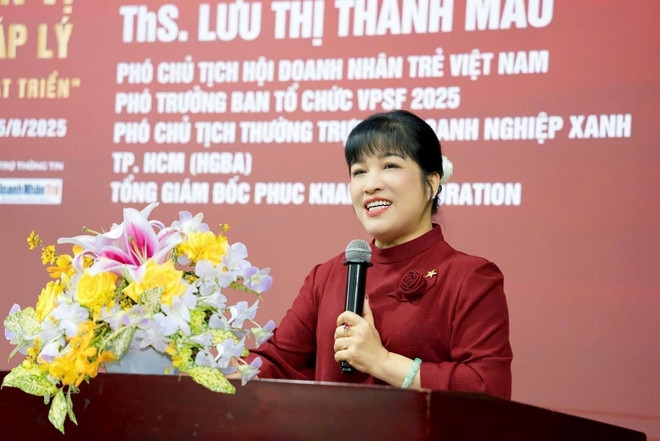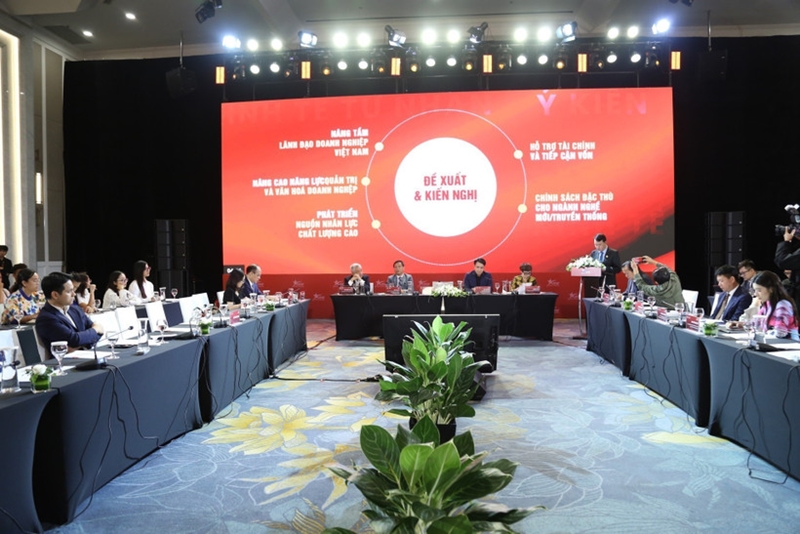This ministerial-level dialogue, the second in a trilogy of local, ministerial, and high-level discussions, focused on fostering a transparent, modern business environment to meet the demands of a rapidly evolving economy. Delegates arrived with meticulously crafted policy proposals.
    |
 |
|
Vice Chairwoman of the Vietnam Young Entrepreneurs Association Luu Thi Thanh Mau speaks at the event. |
One session, devoted to regulatory frameworks and empowering enterprises, tackled the task of dismantling bureaucratic obstacles and addressing the uneven enforcement of policies. Participants pushed for collaborative initiatives to fast-track reforms and establish a transparent legal framework.
Complaints surfaced about persistent inequities between state-owned and private enterprises, alongside regulatory gaps in digital assets, data, and intellectual property under Vietnam’s Civil Code. Green transition policies, urban planning, and sustainable building standards were flagged as lacking precise metrics and evaluation mechanisms, with many issues requiring ministerial-level intervention beyond the reach of local authorities.
Dau Anh Tuan, Deputy Secretary General and head of legal affairs at the Vietnam Chamber of Commerce and Industry (VCCI), stressed the need to decriminalize purely economic and civil disputes to align with the Politburo’s Resolution 68. Citing international best practices and Vietnam’s unique context, he advocated for a sweeping overhaul of criminal and procedural laws to clearly distinguish between criminal, civil, and administrative liabilities, while introducing flexible legal support mechanisms.
Delegates floated ambitious reform proposals, including the creation of a Public-Private Institutional Innovation Coordination Council - a coalition of the Government Office, key ministries, and business leaders tasked with co-drafting decrees and circulars to guide “sandbox” pilots in promising sectors like digital economy, fintech, renewable energy, and health-education technologies.
Another idea was a national digital platform designed to bridge the gap between businesses and regulators in real time. Companies could flag legal and administrative hurdles, and a dedicated task force would ensure swift, transparent settlement within strict deadlines. Artificial intelligence would analyze trends and highlight emerging issues, providing crucial data to drive institutional reforms.
    |
 |
|
At the Vietnam Private Sector Forum 2025 |
A novel “Express Public Service” concept also emerged, proposing a fee-based fast lane for administrative processes. Businesses could pay transparent fees for expedited processing of applications and paperwork, a mechanism proponents said would meet urgent corporate needs while incentivizing public agencies to boost efficiency through legitimate revenue streams.
Beyond institutional reforms, the three other sessions turned to broader horizons: leveraging innovation and technology as growth engines, honing strategic sectors for global reach, and bolstering internal capabilities for transformative change. Yet, all roads led to a singular destination: a partnership with the Government to create an investor-friendly ecosystem that nurtures sustainable private-sector growth.
VPSF 2025 was a national-scale policy and action platform orchestrated by the Vietnam Young Entrepreneurs Association from July to September 2025 under the direction of the Ho Chi Minh Communist Youth Union Central Committee and the Vietnam Youth Federation’s Central Committee, and in coordination with the Vietnam Association of Small and Medium Enterprises. Between July 9 and August 31, 12 local-level dialogues nationwide drew more than 5,000 entrepreneurs and racked up over 3,000 submissions. These feed into the ministerial dialogue, the high-level session with government leaders, the Joint Declaration and the Vietnam Private Sector White Paper 2025.
Source: VNA